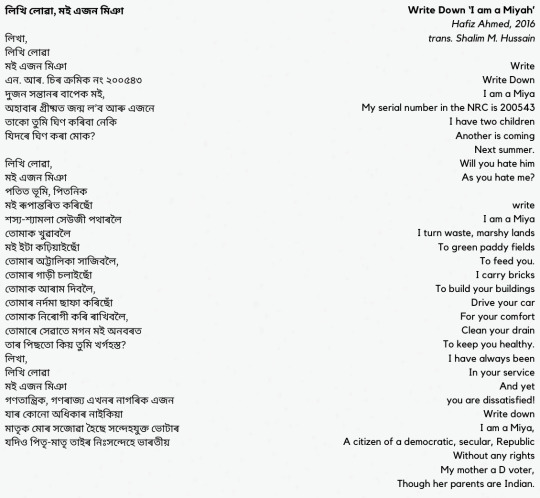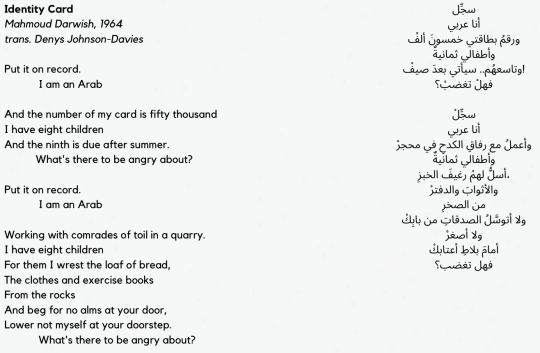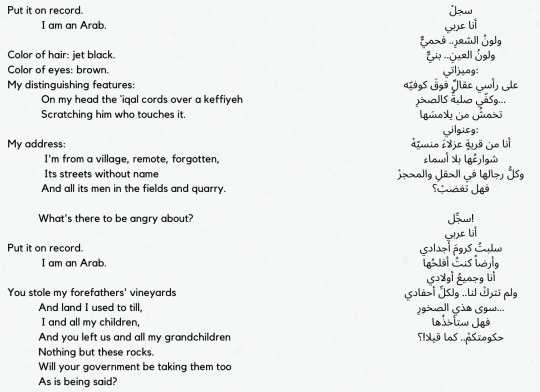#going to use some tags because im personally interested in this poetic movement & connection & maybe other people will be too!
Text


লিখি লোৱা, মই এজন মিঞা ("Write Down 'I am a Miyah'", 2016) by Hafiz Ahmed, translated from Assamese to English by Shalim M. Hussain, began a movement of resistance poetry among Assamese Muslims of Bengali descent, referred to as Miya Poetry after a slur used to describe this community. From Abdul Kalam Azad, for Indian Express ("Write...I am a Miya", 2019):
This poem went viral and other young poets started responding to him through poems. The young poets also started reclaiming “Miya”, a slur used against us, as our identity with pride. This chain of Facebook posts continued for days, reiterating the violence, suffering and humiliation expressed by our community.
As time passed, more poets wrote in various languages and dialects, including many Miya dialects. The nomenclature ‘Miya Poetry’ got generated organically but the poets and their associates have been inspired by the Negritude and Black Arts movements, and queer, feminist and Dalit literary movements, where the oppressed have reclaimed the identity which was used to dehumanise them.
The trend transcended our community. Poets from the mainstream Assamese community also wrote several poems in solidarity with the Miya poets while some regretted not being poets. Gradually, this became a full-fledged poetry movement and got recognised by other poets, critics and commentators. The quality and soul of these poems are so universal that they started finding prominence on reputed platforms.
For the first time in the history of our community, we had started telling our own stories and reclaiming the Miya identity to fight against our harassers who were dehumanising us with the same word. They accused us of portraying the whole Assamese society as xenophobic. The fact is we have just analysed our conditions. Forget generalising the Assamese society as ‘xenophobic’, no Miya poet has ever used the term ‘xenophobic’ nor any of its variants. The guilt complex of our accusers is so profound that they don’t have the patience to examine why we wrote the poems.
Amrita Singh, writing for The Caravan ("Assam Against Itself", 2019), detailed the political backlash against Miya Poetry, in particular the above poem.
On 10 July this year, Pranabjit Doloi, an Assam-based journalist, filed a complaint at Guwahati’s Panbazar police station accusing ten people of indulging in criminal activities “to defame the Assamese people as Xenophobic in the world.” Doloi claimed that the ten people were trying to hinder the ongoing updation of the National Register of Citizens, a list of Assam’s Indian citizens that is due to be published on 31 August. The premise of Doloi’s complaint was a widely-circulated poem called, “Write down I am Miya,” by Hafiz Ahmed, a school teacher and social activist. “Write. Write down I am a Miya/ A citizen of democratic secular republic without any rights,” Ahmed wrote. The police registered a first information report against Doloi’s complaint, booking all ten persons for promoting enmity between groups, among other offences.
[...]
At the press conference, Mander emphasised that people in Assam are in distress because of the NRC’s arbitrary and rigid procedures. “One spelling mistake when you are writing a Bengali name in English … that is enough for you to be in a detention center, declared a foreigner,” Mander said. “If you are not allowing this lament to come out in the form of poetry, then where is this republic of India going?”
Ahmed's poem is influenced in structure by "Identity Card", a 1964 poem by by Palestinian poet Mahmoud Darwish which uses the symbolic figure of the Palestinian working man to confront Israeli occupiers. Darwish's identity card, a symbol of Israeli subjugation transformed into a cry of Palestinian national identity, is reshaped by Ahmed into the National Register of Citizens for Assam and the accompanying fear of statelessness and disenfranchisement for the Miya people.
This solidarity between writers from oppressed groups is, of course, not one that ends with Darwish and Ahmed, nor with the Black, queer, feminist, and Dalit influences of Miya Poetry. As long as there is oppression, there will be companionship and recognition reflected in art and activism. On December 13, 2023, Black Agenda Report reprinted Refaat Alareer's "If I Must Die", acknowledging the connection between Alareer's poem and "If We Must Die" by Claude McKay, written in 1919 in response to the Red Summer white supremacist riots. In 2000, Haitian community activist Dahoud Andre translated "If We Must Die" into Kreyòl, and the Black Agenda Report editorial honors Alareer in a similar way, reprinting "If I Must Die" with an accompanying Kreyòl translation. (POEM: If I Must Die, Refaat Alareer, 2023.)
Transcripts under the cut.




[Hafiz Ahmed Transcripts (Assamese and English):
লিখি লোৱা, মই এজন মিঞা
লিখা,
লিখি লোৱা
মই এজন মিঞা
এন. আৰ. চিৰ ক্রমিক নং ২০০৫৪৩
দুজন সন্তানৰ বাপেক মই,
অহাবাৰ গ্ৰীষ্মত জন্ম ল’ব আৰু এজনে
তাকো তুমি ঘিণ কৰিবা নেকি
যিদৰে ঘিণ কৰা মোক?
লিখি লোৱা,
মই এজন মিঞা
পতিত ভূমি, পিতনিক
মই ৰূপান্তৰিত কৰিছোঁ
শস্য-শ্যামলা সেউজী পথাৰলৈ
তোমাক খুৱাবলৈ
মই ইটা কঢ়িয়াইছোঁ
তোমাৰ অট্টালিকা সাজিবলৈ,
তোমাৰ গাড়ী চলাইছোঁ
তোমাক আৰাম দিবলৈ,
তোমাৰ নৰ্দমা ছাফা কৰিছোঁ
তোমাক নিৰোগী কৰি ৰাখিবলৈ,
তোমাৰে সেৱাতে মগন মই অনবৰত
তাৰ পিছতো কিয় তুমি খৰ্গহস্ত?
লিখা,
লিখি লোৱা
মই এজন মিঞা
গণতান্ত্ৰিক, গণৰাজ্য এখনৰ নাগৰিক এজন
যাৰ কোনো অধিকাৰ নাইকিয়া
মাতৃক মোৰ সজোৱা হৈছে সন্দেহযুক্ত ভোটাৰ
যদিও পিতৃ-মাতৃ তাইৰ নিঃসন্দেহে ভাৰতীয়
ইচ্ছা কৰিলেই তুমি মোক হত্যা কৰিব পাৰা,
জ্বলাই দিব পৰা মোৰ খেৰৰ পঁজা,
খেদি দিব পাৰা মোক মোৰেই গাঁৱৰ পৰা,
কাঢ়ি নিব পাৰা মোৰ সেউজী পথাৰ
মোৰ বুকুৰ ওপৰেৰে চলাব পাৰা
তোমাৰ বুলড্জাৰ
তোমাৰ বুলেটে বুকুখন মোৰ
কৰিব পাৰে থকাসৰকা
(তোমাৰ এই কাৰ্যৰ বাবে তুমি কোনো
স্তিও নোপোৱা)
যুগ-যুগান্তৰ তোমাৰ অত্যাচাৰ সহ্য কৰি
ব্ৰহ্মপুত্ৰৰ চৰত বাস কৰা
মই এজন মিঞা
মোৰ দেহা হৈ পৰিছে নিগ্ৰো কলা
মোৰ চকুযুৰি অঙঠাৰ দৰে ৰঙা
সাৱধান!
মোৰ দুচকুত জমা হৈ আছে
যুগ যুগান্তৰৰ বঞ্চনাৰ বাৰুদ
আঁতৰি যোৱা,
নতুবা
অচিৰেই পৰিণত হ’বা মূল্যহীন ছাইত!
Write Down ‘I am a Miyah’
Hafiz Ahmed, 2016
trans. Shalim M. Hussain
Write
Write Down
I am a Miya
My serial number in the NRC is 200543
I have two children
Another is coming
Next summer.
Will you hate him
As you hate me?
write
I am a Miya
I turn waste, marshy lands
To green paddy fields
To feed you.
I carry bricks
To build your buildings
Drive your car
For your comfort
Clean your drain
To keep you healthy.
I have always been
In your service
And yet
you are dissatisfied!
Write down
I am a Miya,
A citizen of a democratic, secular, Republic
Without any rights
My mother a D voter,
Though her parents are Indian.
If you wish kill me, drive me from my village,
Snatch my green fields
hire bulldozers
To roll over me.
Your bullets
Can shatter my breast
for no crime.
Write
I am a Miya
Of the Brahamaputra
Your torture
Has burnt my body black
Reddened my eyes with fire.
Beware!
I have nothing but anger in stock.
Keep away!
Or
Turn to Ashes.
]
[Mahmoud Darwish Transcripts (Arabic and English):
سجِّل
أنا عربي
ورقمُ بطاقتي خمسونَ ألفْ
وأطفالي ثمانيةٌ
وتاسعهُم.. سيأتي بعدَ صيفْ!
فهلْ تغضبْ؟
سجِّلْ
أنا عربي
وأعملُ مع رفاقِ الكدحِ في محجرْ
وأطفالي ثمانيةٌ
أسلُّ لهمْ رغيفَ الخبزِ،
والأثوابَ والدفترْ
من الصخرِ
ولا أتوسَّلُ الصدقاتِ من بابِكْ
ولا أصغرْ
أمامَ بلاطِ أعتابكْ
فهل تغضب؟
سجل
أنا عربي
أنا اسم بلا لقبِ
صَبورٌ في بلادٍ كلُّ ما فيها
يعيشُ بفَوْرةِ الغضبِ
جذوري
قبلَ ميلادِ الزمانِ رستْ
وقبلَ تفتّحِ الحقبِ
وقبلَ السّروِ والزيتونِ
.. وقبلَ ترعرعِ العشبِ
أبي.. من أسرةِ المحراثِ
لا من سادةٍ نُجُبِ
وجدّي كانَ فلاحاً
بلا حسبٍ.. ولا نسبِ!
يُعَلّمني شموخَ الشمسِ قبلَ قراءةِ الكتبِ
وبيتي’ كوخُ ناطورٍ
منَ الأعوادِ والقصبِ
فهل تُرضيكَ منزلتي؟
أنا اسم بلا لقبِ!
سجلْ
أنا عربي
ولونُ الشعرِ.. فحميٌّ
ولونُ العينِ.. بنيٌّ
وميزاتي:
على رأسي عقالٌ فوقَ كوفيّه
وكفّي صلبةٌ كالصخرِ...
تخمشُ من يلامسَها
وعنواني:
أنا من قريةٍ عزلاءَ منسيّهْ
شوارعُها بلا أسماء
وكلُّ رجالها في الحقلِ والمحجرْ
فهل تغضبْ؟
سجِّل!
أنا عربي
سلبتُ كرومَ أجدادي
وأرضاً كنتُ أفلحُها
أنا وجميعُ أولادي
ولم تتركْ لنا.. ولكلِّ أحفادي
سوى هذي الصخورِ...
فهل ستأخذُها
حكومتكمْ.. كما قيلا!؟
إذنْ
سجِّل.. برأسِ الصفحةِ الأولى
أنا لا أكرهُ الناسَ
ولا أسطو على أحدٍ
ولكنّي.. إذا ما جعتُ
آكلُ لحمَ مغتصبي
حذارِ.. حذارِ.. من جوعي
ومن غضبي!!
Identity Card
Mahmoud Darwish, 1964
trans. Denys Johnson-Davies
Put it on record.
I am an Arab
And the number of my card is fifty thousand
I have eight children
And the ninth is due after summer.
What's there to be angry about?
Put it on record.
I am an Arab
Working with comrades of toil in a quarry.
I have eight children
For them I wrest the loaf of bread,
The clothes and exercise books
From the rocks
And beg for no alms at your door,
Lower not myself at your doorstep.
What's there to be angry about?
Put it on record.
I am an Arab.
I am a name without a title,
Patient in a country where everything
Lives in a whirlpool of anger.
My roots
Took hold before the birth of time
Before the burgeoning of the ages,
Before cypress and olive trees,
Before the proliferation of weeds.
My father is from the family of the plough
Not from highborn nobles.
And my grandfather was a peasant
Without line or genealogy.
My house is a watchman's hut
Made of sticks and reeds.
Does my status satisfy you?
I am a name without a surname.
Put it on record.
I am an Arab.
Color of hair: jet black.
Color of eyes: brown.
My distinguishing features:
On my head the `iqal cords over a keffiyeh
Scratching him who touches it.
My address:
I'm from a village, remote, forgotten,
Its streets without name
And all its men in the fields and quarry.
What's there to be angry about?
Put it on record.
I am an Arab.
You stole my forefathers' vineyards
And land I used to till,
I and all my children,
And you left us and all my grandchildren
Nothing but these rocks.
Will your government be taking them too
As is being said?
So!
Put it on record at the top of page one:
I don't hate people,
I trespass on no one's property.
And yet, if I were to become hungry
I shall eat the flesh of my usurper.
Beware, beware of my hunger
And of my anger!
]
#it speaks!#re: the tag on my last reblogged post. decided to make that point its own post!#this is long obviously and im employing proper capitalization for ease of reading#obligatory im monolingual disclaimer & cant vouch for translation quality; i chose the johnson-davies translation because ->#<- it is the one i see most commonly spread. i take responsibility for any deficiencies.#going to use some tags because im personally interested in this poetic movement & connection & maybe other people will be too!#palestine#palestinian poetry#assam#miya poetry#political poetry#poetry
5 notes
·
View notes